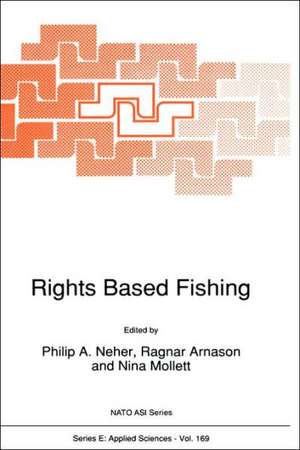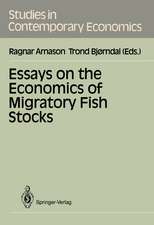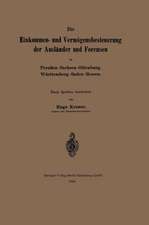Rights Based Fishing: NATO Science Series E:, cartea 169
Editat de P.A. Neher, Ragnar Arnason, Nina Molletten Limba Engleză Hardback – 30 apr 1989
Toate formatele și edițiile
| Toate formatele și edițiile | Preț | Express |
|---|---|---|
| Paperback (1) | 2481.76 lei 6-8 săpt. | |
| SPRINGER NETHERLANDS – oct 2011 | 2481.76 lei 6-8 săpt. | |
| Hardback (1) | 2488.23 lei 6-8 săpt. | |
| SPRINGER NETHERLANDS – 30 apr 1989 | 2488.23 lei 6-8 săpt. |
Din seria NATO Science Series E:
- 24%
 Preț: 1570.65 lei
Preț: 1570.65 lei -
 Preț: 397.76 lei
Preț: 397.76 lei -
 Preț: 386.81 lei
Preț: 386.81 lei - 20%
 Preț: 346.24 lei
Preț: 346.24 lei -
 Preț: 424.33 lei
Preț: 424.33 lei - 18%
 Preț: 1224.18 lei
Preț: 1224.18 lei - 18%
 Preț: 1836.63 lei
Preț: 1836.63 lei - 18%
 Preț: 1229.28 lei
Preț: 1229.28 lei -
 Preț: 381.00 lei
Preț: 381.00 lei -
 Preț: 409.30 lei
Preț: 409.30 lei - 18%
 Preț: 1841.36 lei
Preț: 1841.36 lei - 5%
 Preț: 367.28 lei
Preț: 367.28 lei -
 Preț: 407.19 lei
Preț: 407.19 lei - 18%
 Preț: 1838.38 lei
Preț: 1838.38 lei -
 Preț: 420.28 lei
Preț: 420.28 lei -
 Preț: 399.29 lei
Preț: 399.29 lei -
 Preț: 398.74 lei
Preț: 398.74 lei - 18%
 Preț: 3026.13 lei
Preț: 3026.13 lei -
 Preț: 388.90 lei
Preț: 388.90 lei - 5%
 Preț: 391.06 lei
Preț: 391.06 lei - 18%
 Preț: 1228.62 lei
Preț: 1228.62 lei - 18%
 Preț: 1229.73 lei
Preț: 1229.73 lei - 18%
 Preț: 1234.46 lei
Preț: 1234.46 lei - 5%
 Preț: 3532.05 lei
Preț: 3532.05 lei - 18%
 Preț: 1840.11 lei
Preț: 1840.11 lei - 5%
 Preț: 378.80 lei
Preț: 378.80 lei - 18%
 Preț: 1227.84 lei
Preț: 1227.84 lei -
 Preț: 392.75 lei
Preț: 392.75 lei -
 Preț: 395.63 lei
Preț: 395.63 lei - 18%
 Preț: 2489.30 lei
Preț: 2489.30 lei - 5%
 Preț: 1429.27 lei
Preț: 1429.27 lei -
 Preț: 396.02 lei
Preț: 396.02 lei - 5%
 Preț: 2142.61 lei
Preț: 2142.61 lei - 18%
 Preț: 3049.16 lei
Preț: 3049.16 lei - 18%
 Preț: 1844.54 lei
Preț: 1844.54 lei -
 Preț: 403.53 lei
Preț: 403.53 lei
Preț: 2488.23 lei
Preț vechi: 3034.43 lei
-18% Nou
Puncte Express: 3732
Preț estimativ în valută:
476.11€ • 497.10$ • 394.05£
476.11€ • 497.10$ • 394.05£
Carte tipărită la comandă
Livrare economică 04-18 aprilie
Preluare comenzi: 021 569.72.76
Specificații
ISBN-13: 9780792302469
ISBN-10: 079230246X
Pagini: 541
Ilustrații: XIV, 541 p.
Dimensiuni: 156 x 234 x 32 mm
Greutate: 0.96 kg
Ediția:1989
Editura: SPRINGER NETHERLANDS
Colecția Springer
Seria NATO Science Series E:
Locul publicării:Dordrecht, Netherlands
ISBN-10: 079230246X
Pagini: 541
Ilustrații: XIV, 541 p.
Dimensiuni: 156 x 234 x 32 mm
Greutate: 0.96 kg
Ediția:1989
Editura: SPRINGER NETHERLANDS
Colecția Springer
Seria NATO Science Series E:
Locul publicării:Dordrecht, Netherlands
Public țintă
ResearchCuprins
I. Foundations of Right s Based Fishing.- Conceptual Origins of Rights Based Fishing.- Comments — Gary D. Libecap.- Is Fishery Management at a Turning Point? Reflections on the Evolution of Rights Based Fishing.- Comments — Daniel D. Huppert.- II. Traditional and Territorial Use Rights.- The Organization of Traditional Inshore Fishery Management Systems in the Pacific.- Comments — Theodore Panayotou.- III. Exclusive Economic Zones.- Coastal State “Rights” Within the 200-mile Exclusive Economic Zone.- IV. Individual Transferable Quotas: Part One.- The Development and Implementation of New Zealand’s ITQ Management System.- Comments — Daniel D. Huppert.- Comments — James E. Wilen.- Applied Fisheries Management Plans: Individual Transferable Quotas and Input Controls.- Comments — Peder Andersen.- V. Individual Transferable Quotas: Part Two.- Conceptual Constructs for Practical ITQ Management Policies.- Comments — Gary B. Libecap.- Minimum Information Management with the Help of Catch Quotas.- Comments — Parzival Copes.- VI. License Limitation.- Rent Generation in Limited Entry Fisheries.- Comments — Rögnvaldur Hannesson.- VII. Enterprise Quotas.- Enterprise Allocations: The Atlantic Canadian Experience.- Comments — Michael Gardner.- The Enterprise Allocation System in the Offshore Groundfish Sector in Atlantic Canada.- VIII. Fee Fishing.- Development, Economics and Fishing Rights in the South Pacific Tuna Fishery.- Comments — Kenneth Ruddle.- IX. Empirical Modelling.- Individual Transferable Quotas in the Southern Bluefin Tuna Fishery: An Economic Appraisal.- Comments — Parzival Copes.- Price Response and Optimal Vessel Size in a Multi-Output Fishery.- Comments —John M. Gates.- An Econometric Study of Regulatory Enforcement and Compliance inthe Commercial Inshore Lobster Fishery of Massachusetts.- Comments —Daniel V. Gordon.- X. Theoretical Modelling.- Should Quotas be Based on Shadow Value Rather than Weight? A Numerical Study on the Icelandic Cod Fisheries.- Comments — Trond Bjørndal.- Catch Quotas and the Variability of Allowable Catch.- Fixed or Variable Catch Quotas? The Importance of Population Dynamics and Stock Dependent Costs.- Comments — PederAndersen.- The Economics of Predator-Prey Harvesting.- Fishing Quota Management with Multiple Stock Objectives.- Comments —James E. Wilen.- Author Index.



















